The Blue Fox: A Novel Read online
Page 4
Abba bought these rich clothes for herself, paying out of the wages she received for assisting with the unusual farming that is practised at Brekka; on the one hand the collecting of plants, on the other the creation of small books on Icelandic flora: ‘with fifty-seven genuine dried samples’, as was said of them in the article about Iceland in the Illustrierte Zeitung. These were the sorts of books romantic young men gave to their future brides, and the last pages were left empty for the composition of pretty poems.
Fridrik kneels beside the coffin, holding a different sort of book; it is thick and psalter-like, with the odd bird’s feather sticking out from between the pages. This is Abba’s bird book, in which she collected feathers with passion and exactitude. She glued them to the pages, and under her instruction Fridrik recorded the names and gender of the birds, and the provenance of the feathers. He had often wondered where Abba had picked up all her bird-lore, but there were no answers to be had from her, and when he tried to teach her more natural history, she thanked him politely, saying merely that she was interested in birds.
On the title page she herself had written: ‘BiRRds of tHE WOrld – AbbA fRom BreKKa’.
Fridrik places the book on Abba’s breast and lays her hands to rest in a cross on top. He inadvertently holds them tighter than intended and feels the small fingers through the mittens. This cheers him a little; these are the hands that comforted him after he lost his parents.
He kisses her brow.
He closes the coffin.
Fridrik finishes filling in the grave. He takes off his woollen cap, folds it and puts it in his jacket pocket. He pulls off his gloves and shoves them in his armpits.
He falls to his knees.
He bows his head.
He sighs sorrowfully.
Straightening up, he gazes down through the earth to where he pictures Abba’s face, and recites two verses for her. The first is an optimistic poem; a little bird rhyme of his own making:
A summer bird sang
On a sunny day:
Happiness led me,
O’er the airy way
My friend for to see.
The little bird sang
of its rowan tree.
The second is the introduction to a lost ballad. It tells of the equality that all living beings are ensured in death, without any need for revolution:
Earth fails,
All grows old and worn.
Flesh is dust – however it’s adorned.
Rising to his feet, he puts on his cap, reaches into his pocket for a little pipe made from a sheep’s leg bone and plays a tune from ‘The Death of the Nightingale’ by the late Franz Schubert, thus linking the two poetic fragments.
Then at last Fridrik’s eyes fill with tears: they set off down his cheeks but dry up halfway; it’s cold out. He bids farewell to Hafdis Jonsdottir with the same words as she took her leave of him:
‘Abba-ibo!’
***
Between the peaks to the west, there is a glimpse of the universe where three stars of the constellation Cygnus glitter.
Heavy banks of cloud overshadow the valley.
It snows until late in the morning.
The sky is clear and the first blush of day at its winter blackest. Fridrik B. Fridjonsson stands out in the yard at Brekka, hidden by the farmhouse door, smoking opium-moistened tobacco in his pipe.
Something brushes against his foot: the oldest tom cat in Northern Europe: Little Frikki. He’s cold after his feline ‘Winterreise’ and wants to be let in. His namesake obliges him.
Shortly afterwards he sees a man emerge from the farmhouse at Dalbotn. It’s Reverend Baldur Skuggason, like a little bump in the landscape. A tiny stick juts up from his left shoulder: his gun.
He slides down over the homefields, then sets a course north over the Asar for the cliffs at Bjarg.
Herb-Fridrik knocks out his pipe on the heel of his shoe.
And goes inside to sleep.
III
(11–17 January 1883)
The shot fires off. It blows away the divine peace of the wilderness like a scrap of paper. A shower of sparks bursts from the barrel. The gunpowder crack shouts: ‘HEAR THE MAN!’
The vixen is thrown up in the air with a pathetic whine.
Reverend Baldur crawls to his feet.
Purple suns and streaks of lightning dazzle his eyes, there’s a harsh jangling in his ears. His legs are stiff from lying in the snow but the lifeblood surges through his body as soon as he moves.
The priest creeps over to the rock and checks on the little fox. Yes, there she lies, dead as a doornail. He sinks down on his right knee and seizes the fur by the tail; it appears quite intact – there’ll be some value in that.
He straightens up, cramming the vixen inside his coat.
***
The highest knob of the Asheimar peak is known as the eastern high knob. The peak faces more or less west, but has a razor-sharp horn, which means that the slope known as the southern slope in fact faces south-south-west.
In north-easterly blizzards a vast snowdrift forms on the south face of this horn, stretching right from the highest pinnacle down to the roots of the peak.
There stood Reverend Baldur, the firearm in his left hand, his right arm buried up to the wrist in his coat, like Napoleon in the desert.
When the peak replied to his shot.
***
The drift splits in the middle with such a thunderous crack that the loose snow is whirled up around Reverend Baldur, obscuring his figure and blotting out his view in all directions. The lower section of the drift sets off down the mountain – snatching up the priest on the way.
He somersaulted over the precipice, landing alternately on hands and feet, tumbling over and over, losing both his fur hat and his gun. He was carried for a long way on all fours before finally landing on both feet at once. Then he managed to withstand the avalanche for a brief moment before it knocked him flat – and after that he was carried along alternately over or under the snow; sometimes half, mostly wholly submerged. In this way Reverend Baldur took flight.
All the time he remained perfectly conscious, never buried for long.
***
The man travelled some two hundred yards downhill in this manner before the avalanche came to a halt. This was by the high crags on the brink of Freyja’s Chair, as they call the deep bowl in the slopes of Asheimar. Below that lies the steep slope of the Kinnar, light of brow, beneath the foot of the glacier.
Reverend Baldur lay still, recovering from his journey. He was winded and coughed a little, having scarcely drawn breath during his descent. He couldn’t expand his chest for the weight of snow pressing on every side. He was completely buried, apart from his head and right shoulder, which protruded from the snow. He tried to move but could barely twitch his right foot or shrug his shoulder. There was a pain in his left thigh and he suspected it was broken as his leg was numb.
The weather was mild, with light cloud and a gentle southerly breeze; the winter sun floated over the wilderness, fat and red as the yolk of a raven’s egg. This was the calm that had ridden on the wings of yesterday’s storm.
***
A shadow darkened the snow crust and a moment later a raven landed there. It cocked its head on one side, examining the man stuck fast in the snow trap. Reverend Baldur jerked his head and shooed the unwelcome visitor away:
‘Damn you, you ugly cur of Odin!’
But the raven was no more obedient than usual. It called to its namesake and the next time the priest looked round there were two of them. They waddled to and fro, sharpening their beaks, occasionally craning their necks towards the man and breaking out in a hideous carrion song:
‘Kark, kark ...’
They took little hops towards him, like eager guests at a feast. But when the larger raven snatched at the priest’s scarf and began to tear out the wool, Reverend Baldur felt it was high time he put an end to this provocation. After a great argument with the drift
he managed to wrangle his right leg free, and shortly afterwards it yielded up his arm.
Finally, after a long and weary struggle, he crawled out of ‘the snow-white tomb’, having spent most of his time keeping the ravens at bay with snowballs and threats.
***
Although Reverend Baldur was now above ground, he wasn’t quite free of the snow. It had drifted into his clothes during his breakneck descent and lay between the layers, even against his bare skin. And now the slush began to run down his body in icy streams, from his armpits, down his chest and back, and into his shoes.
The priest growled low as the water turned tepid on his battered body.
***
Reverend Baldur began to think about his journey home; it looked as if he would have to follow the belt of rock west, all the way to the crevasse ... Or go in completely the opposite direction and try walking along the River Mjadara ... Or ... The priest couldn’t complete his thoughts for the ravenous cries of the ravens. They roved around, bent double with hunger, rolled on their backs, croaked and beat their wings on the frozen earth.
He shook his fist at the birds and yelled:
‘Silence, or I’ll scorch off your damned heads!’
The household at Dalbotn were familiar with the headache cure of burning a raven’s head in a pot and blending strong lye with the ash. The mixture was then smeared on the sore spot and left there until the pain subsided.
And now, as chance would have it, the raven pair obeyed. They fell silent as one, lifted off from the snowfield and soared easily over the edge of the bowl without so much as flapping a wing. There the updraught caught them and raised them high into the blue.
Then they were beautiful.
***
Reverend Baldur hawked vigorously, intending to spit after the birds, but before he could let fly he heard a deep whistling sound from above. He looked over his shoulder and scanned the peak of Asheimar; the upper part of the drift had vanished from the highest knob.
In that very instant the avalanche paid the priest a visit. It clapped him on the back and swept him over the cliff. On the way he scraped against the edge, flaying his balaclava up to his crown and tearing a chunk of fat from his neck.
During the fall it occurred to him that there was less risk of injury if his body was limp. When he came down on the slope of Kinnar, he halted for a split second, then was whirled away again twice as fast as before – now head first. Reverend Baldur suspected that this was his last hour but took it for granted that he should resist his fate. So he tried to raise his head above the avalanche, lifting it as best he could.
The priest felt as if he were caught in the midst of a raging storm but there were no further discomforts until he began to have difficulty breathing.
***
Shortly afterwards the priest’s hell-ride down the hard-packed snow came to an end.
What happened was that the avalanche reared up like a wave on a stony shore and when it broke on the glacial moraine it shot the man into a small cave – a kind of elongated hollow that had formed at the end of the last ice age when the glacial tongue lumbered over the mountain root, extracting a thirty-yard long molar of rock.
That is to say, Reverend Baldur came to rest in a hollow under the glacier.
And the avalanche closed it off with its full weight.
He lay on his back, his right leg straight and about a yard higher than his head, his left leg bent and his left arm on his belly. His right arm was also bent and oddly twisted. The haversack had come off his left arm and the leather strap lay about his right elbow, trapping his upper arm.
The priest was not in a good way but this did not bother him as he was dead to the world.
***
Now it was fortunate for Reverend Baldur that he was well wrapped up.
His mother, Nal Valdimarsdottir, had dressed him for the fox hunt. He wore thick, homespun undergarments, so well fulled that they could stand up on their own; a middle shirt of rabbit skin; two woollen sweaters, one light and the other very thick; Danish trousers; three pairs of knitted stockings; and unshaven sealskin shoes on his feet. Over all he wore leather trousers and a leather coat; double-breasted with whalebone buttons.
But, most important of all, Nal had equipped her son with a scarf of her own knitting. He had wound the scarf around his head to make himself invisible to the vixen and this get-up had prevented the priest from losing anything in the first avalanche but the hat that perched on top, a German piece made of kid, while on the second journey the scarf had held the balaclava in place, although it was now half off his head.
On his chest he had the wretched vixen.
***
The rock splits open behind the man. In the doorway stands a young woman clad in nothing but blue knitted drawers and a red tasselled cap. She takes the man’s hand and guides him into a low-ceilinged chamber. There is a well in the middle of the floor with lead shot floating on the water, not sinking, so the surface is grey with shot.
She points at it and says:
‘This is the Well of Life.’
The priest stirred.
The glacier admitted a dim blue shadow into the little rock chamber and by that faint light Reverend Baldur could make out his surroundings. He lay at the foot of a wall, which must be the eastern wall. He had scrabbled a little with his left foot in his sleep, but the right leg was still stuck fast, pointing straight up in the air. He couldn’t sit up or twist round or free himself, however furiously he struggled.
He soon grew weary from his exertions, a drowsiness fell on him and he lost consciousness once more.
***
The man thought he must have nodded off, for when he was startled awake by his right leg falling to the floor with a noisy splash, it seemed to him that the very rainbow itself was shining in through the ice-eye of the cave mouth. He simply couldn’t work out where the colours were coming from, but guessed that it was night outside and the Aurora Borealis sisters had followed him from Asheimar – they were greeting their old friend Baldur Skuggason.
The priest thought this was most obliging of them.
He was feeling rather chilly so he tried to move and that warmed him up again. He drifted off for an hour or so at intervals during the night, shifting position in between times – but not enough to tire himself out. The strap on his haversack grew steadily tighter on his right arm but he couldn’t reach the knife in his belt to cut it.
The man knew that it was possible to survive for a long time in a snowdrift, but expected the glacier to prove a cold bedspread – the advantage was that he would gradually grow wetter from the snow, which was melting around him.
The evening of the second day drew on.
***
Next morning the heat from Reverend Baldur’s bodily engine had told upon the snow by his left arm and head. He was reasonably compos mentis and able to rise up on his elbow. He noticed that the snow was dark where his head had dented it. And at this sight he became aware of a stinging in his neck. He pulled off his mitten, reached a hand behind him and groped his nape: he seemed to have acquired a new mouth where the flesh bulged between neck-bone and shirt collar.
He fumbled this phenomenon for a good while before drawing back his hand. It was covered in blood, which appeared black in the deceptive light of the fissure. Reverend Baldur licked the gore from his fingers; nothing nutritious must go to waste. Then he placed the mitten on the wound and bound the scarf round his neck, pulling it good and tight.
He fell into a deep sleep.
***
Twilight fell, not gradually but abruptly, bringing a black murk.
Around midnight, in all likelihood, he sensed a wetness from the snow, and towards morning on the fourth day there had been such a thaw around Reverend Baldur that he was able to remove his belt, get at his knife and cut through the offending strap. Sitting up, he dragged the haversack to him. There he had provisions: a dried cod’s head.
Dried cod’s head is not merely food fit
for a gentleman; it is also a diversion. As he flayed the flesh from the head, putting it in his mouth on the point of his knife and chewing as slowly as he could, to make it last, the man amused himself by naming all the bones and parts of the head:
‘Jawbone, that’s the jaw muscle, shoulder bone, that’s the shoulder muscle, pillow bone, that’s the pillow muscle, raven bone, that’s the raven muscle, gum, that’s the gum muscle, cheek, that’s the cheek muscle, nape, that’s the nape muscle, bell, that’s the bell muscle.
‘And that’s all the bones in this old head!’
Reverend Baldur burst out laughing. He pictured that ancient hag, his mother, with the hook bone on her shrivelled lower lip, mumbling:
‘My little bit, my little bit ...’
The priest couldn’t control his mirth. He gripped his belly and laughed. He laughed until he howled with laughter. He howled with laughter until he cried. He cried and his tears were sore.
Yes, he wept sorely for the evil fate that had left him alone, with no one to share the entertainment that is to be had from a dried cod’s head.
***
On the fifth day the priest under the glacier began to fear for his sanity, so he did what comes most naturally to an Icelander when he is in a fix. That is to recite ballads, verses and rhymes, sing loud and clear to himself and, when all else fails, to recall his hymns. This is a failsafe old trick, if men wish to preserve their wits.

 The Blue Fox: A Novel
The Blue Fox: A Novel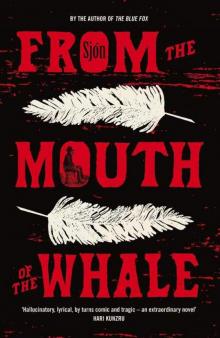 From the Mouth of the Whale
From the Mouth of the Whale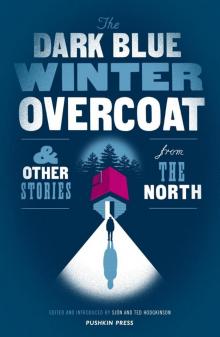 The Dark Blue Winter Overcoat and Other Stories from the North
The Dark Blue Winter Overcoat and Other Stories from the North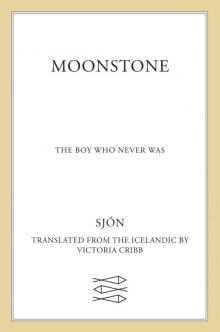 Moonstone
Moonstone CoDex 1962
CoDex 1962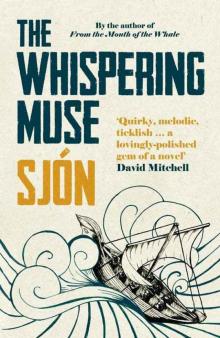 The Whispering Muse: A Novel
The Whispering Muse: A Novel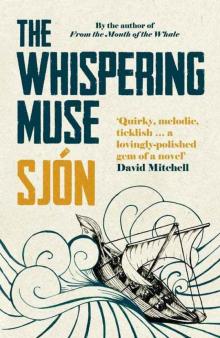 The Whispering Muse
The Whispering Muse The Blue Fox
The Blue Fox